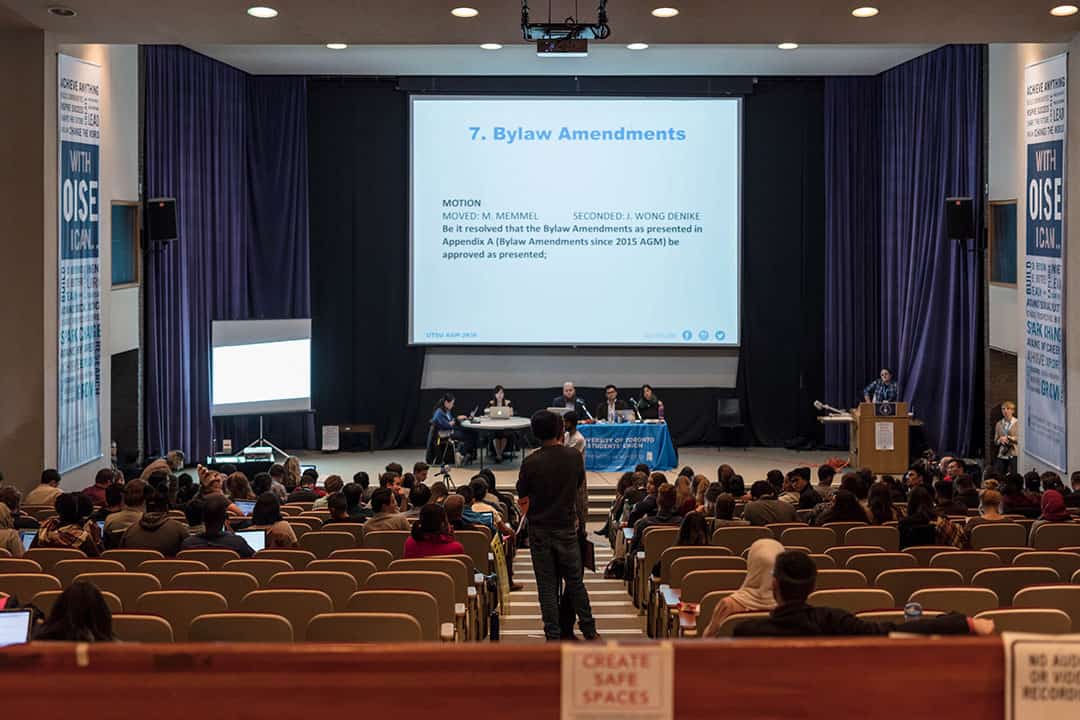The University of Toronto Students’ Union (UTSU) is holding its Annual General Meeting (AGM) on October 30 in room 102 of the Mechanical Engineering Building.
The highlight of the meeting, it seems, is a motion on the agenda that seeks to add a new bylaw to the UTSU, Bylaw XIX, that would bar the union from entering into any agreement with an organization unless the Board of Directors can terminate the agreement by a simple majority vote.
The proposed bylaw also states that the UTSU “shall not enter into a perpetual agreement” — an exchange of goods and services recurring indefinitely — that cannot be terminated in the same way.
The bylaw would prohibit the UTSU from joining groups similar to the Canadian Federation of Students (CFS), an organization of which some members of the UTSU Board of Directors have been highly critical. Currently, YouDecide U of T is petitioning students to leave the CFS. “Bylaw XIX wouldn’t apply retroactively, so it wouldn’t have any effect on the UTSU’s relationship with the CFS,” said UTSU President Mathias Memmel. He said the proposed bylaw is meant to ensure that “the UTSU’s autonomy isn’t taken lightly.”
The president’s address and presentation of audited financial statements are also on the agenda.
Explaining the AGM structure
All full-time undergraduate students at UTSG and UTM are members of the UTSU can vote in the AGM. If you cannot attend a meeting, you are able to proxy your vote to someone who can, though the deadline to do so this year has passed. Quorum, or the minimum amount of members required to be present in order to begin the meeting, is set at 75; 50 of those members must be physically present, the rest can consist or proxied votes.
The board is divided into six “top level constituencies,” according to Memmel. These constituencies include the Executive Commitee, colleges, professional faculties, admissions categories, and the UTMSU.
The Executive Committee is made up of the UTSU’s seven executives, including Memmel. The colleges are represented by directors; the number of representatives for each college is reexamined every year based on student population.
The professional faculties include Engineering and Applied Sciences, Architecture and Visual Studies, Law, Music, Medicine, Nursing, and Dentistry. They are all represented by directors in the same manner as the colleges. The formula for the number of seats afforded to differently-sized constituencies can be found below.
| Number of students registered in the constituency | Number of seats |
| 25-1,999 | 1 |
| 2,000-3,999 | 2 |
| 4,000-8,999 | 3 |
| 9,000-15,999 | 4 |
| 16,000-24,999 | 5 |
Each of the six admissions categories are represented by one Academic Director: Computer Science, Humanities, Life Sciences, Mathematics and Physical Sciences, Rotman Commerce, and Social Sciences.
Eight seats on the board are allocated for University of Toronto Mississauga Students’ Union Directors, who are appointed by the UTMSU. Another seven seats are filled by General Equity Directors, who are appointed by the board.
Robert’s Rules of Order
All UTSU meetings operate under Robert’s Rules of Order. The rules were established by a US Army Officer named Henry Martyn Robert in 1876 by emending congressional procedure for non-legislative bodies. According to Memmel, Robert’s Rules are used by most corporate boards and have been used by the UTSU for “a very long time; probably decades.”
The basic meeting structure under Robert’s Rules begins with a Call to Order; this is done by Speaker Billy Graydon in the case of the UTSU. The pre-determined agenda must then be approved by a majority of voting members in the room. At this point, members can propose amendments to the agenda. Once all amendments have been heard and voted on, the agenda can be approved and the meeting can proceed.
This process applies to all motions. After a motion on the agenda is seconded, discussion takes place and members vote on the it. Some motions require a majority vote in order to pass, while others need a two-thirds majority, or in some cases unanimous consent. The passing requirements are decided by the UTSU’s governing documents, including its bylaws, policies, the Canadian Non for Profit Corporations Act, and Robert’s Rules.
If a member is not following Robert’s Rules, such as discussing a motion when it has not been announced by the speaker or making a personal affront against someone, a point of order can be made to object to procedure. A point of information can be made to request clarification or information on a particular motion or subject in a motion.


